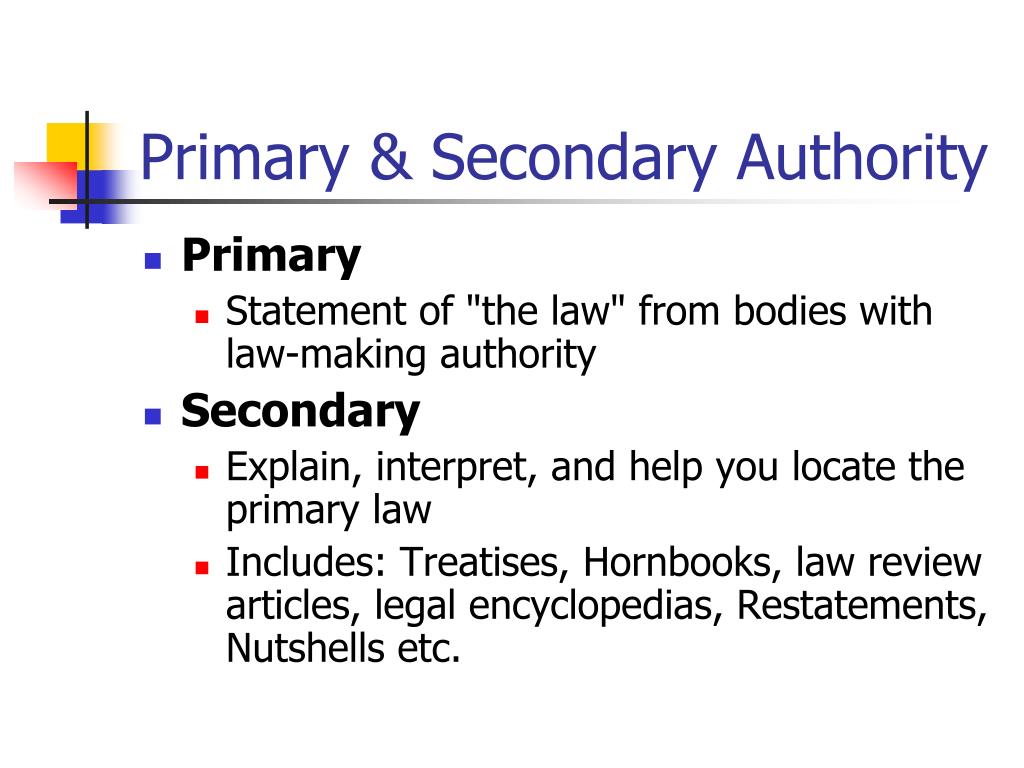
"Although they cannot be directly relied upon as legal authority, secondary sources remain some of the most important authorities to employ in legal arguments. As most attorneys learned in their first year of law school, secondary sources are authorities that explain different points of law, but do not themselves carry the weight of establishing the law. These sources come in a variety of forms, each with its own unique purposes and uses." Jeremy Byellin, The Basics of Secondary Sources - What, Why, How, WestLaw Thomson Reuters (last visited Apr. 22, 2021).
"There are a number of reasons why secondary sources are so essential to the practice of law. One of the chief reasons being that secondary sources may reflect the prevailing view on how courts interpret primary sources. Some secondary sources are so authoritative that courts themselves rely on them in their rulings. Restatements of the Law are a prime example of such an authority. Many courts are perfectly comfortable citing to a particular section of a Restatement to explain a particular legal issue. Similarly, Jury Instructions are widely relied upon by state and federal courts across the country as a highly authoritative reference when submitting instructions to the jury." Id.
"Many secondary sources have value beyond being citable in a legal argument. Specifically, many titles offer valuable insight into recent court decisions or new statutes. Some may analyze new legal authorities to break down their meaning in more digestible terms, while others may consider the potential implications of a new ruling or law. Still more secondary sources may examine topical legal trends or the current state of a particular area of law, based on recent court decisions or updates to statutes." Id.
"In short, because secondary sources reflect how the law is viewed, they are truly essential to a more comprehensive understanding of the law." Id.
Restatement (Second) of Torts, ch. 37 (Am. L. Inst. 1979).
§ 766 - Intentional Interference with Contract Performance
"One who intentionally and improperly interferes with the performance of a contract (except a contract to marry) between another and a third person by inducing or otherwise causing the third person not to perform the contract, is subject to liability to the other for the pecuniary loss resulting to the other from the failure of the third person to perform the contract."
§ 767 - Factors in Determining Improper Interference
"In determining whether an actor's conduct in intentionally interfering with a contract or a prospective contractual relation of another is improper or not, consideration is given to the following factors:
(a) the nature of the actor's conduct,
(b) the actor's motive,
(c) the interests of the other with which the actor's conduct interferes,
(d) the interests sought to be advanced by the actor,
(e) the social interests in protecting the freedom of action of the actor and the contractual interests of the other,
(f) the proximity or remoteness of the actor's conduct to the interference and
(g) the relations between the parties."
§ 768 - Competition as Proper or Improper Interference
"(1) One who intentionally causes a third person not to enter into a prospective contractual relation with another who is his competitor or not to continue an existing contract terminable at will does not interfere improperly with the other's relation if
(a) the relation concerns a matter involved in the competition between the actor and the other and
(b) the actor does not employ wrongful means and
(c) his action does not create or continue an unlawful restraint of trade and
(d) his purpose is at least in part to advance his interest in competing with the other.
(2) The fact that one is a competitor of another for the business of a third person does not prevent his causing a breach of an existing contract with the other from being an improper interference if the contract is not terminable at will."
§ 772 - Advice as Proper or Improper Interference
"One who intentionally causes a third person not to perform a contract or not to enter into a prospective contractual relation with another does not interfere improperly with the other's contractual relation, by giving the third person (a) truthful information, or (b) honest advice within the scope of a request for the advice."
§ 774 - Agreement Illegal or Contrary to Public Policy
"One who by appropriate means causes the nonperformance of an illegal agreement or an agreement having a purpose or effect in violation of an established public policy is not liable for pecuniary harm resulting from the nonperformance."
Alex B. Long, The Business of Law and Tortious Interference, 36 St. Mary's L.J. 925 (2005).
Mark R. Hinkston, Tortious Interference with At-Will Employment, 74 Wisc. Law. 14 (2001).
John A. Conway & Eve L. Pouliot, Business Torts, 48 SMU L. Rev. 919 (1995).
Joseph Hennessey, Protecting Business Relationships, 43 Trial 34 (2007).

